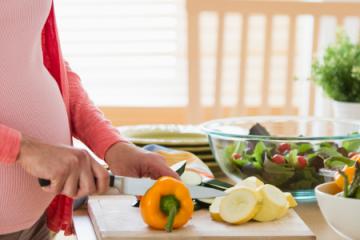




The summer diet for pregnancy: rules to follow and useful tips (without missing a thing)
What is the right diet? Am I eating enough and in the right way? For pregnant women, especially if you are expecting your first child, these two questions can become a hassle. Doubts that are accentuated especially in summer when the heat gets in the way of appetite. As the temperature rises, hunger disappears and it becomes more difficult to eat properly. So what are the foods to prefer and those to avoid? Here is a series of tips for eating properly and healthily even in the hottest season.
We must say that in summer with the high temperatures the body sweats more and consumes less. The risks, especially for an expectant woman, are water retention and dehydration.
The first rule, therefore, is to hydrate the organism. During pregnancy, especially from the third month onwards, the mother-to-be needs an extra 1-1.5 litres of water a day. Drinking at least two litres therefore becomes an absolute must. However, in summer there are certain foods that can help. Fruit and vegetables are the ‘queens’ of the hot season; rich in water, you should consume five portions a day. Summer fruit is particularly tasty, rich in vitamins and minerals. There are some varieties, such as figs, that are sweeter than others, such as berries or red plums, which, thanks to their antioxidant substances, improve the tone and elasticity of blood vessels.
As for vegetables, from the second trimester of pregnancy it is possible to eat them raw, but wash them thoroughly. In summer, salads are popular, while vegetables can be a good snack. So give way to carrots, celeries and cucumbers. Through food, you can also fight the annoying problem of cramps. There are foods, rich in minerals, that prevent the problem: dried fruit contains potassium; dairy products contain calcium; almonds, walnuts and hazelnuts contain magnesium.
It should also be remembered that the usual rule applies in summer nutrition: not missing a thing. And so, even in hot weather, carbohydrates and proteins retain their importance. The former help to give energy to the body. In summer, you can indulge in rice, pasta, spelt and barley salads. Single, tasty dishes that are also easy to eat under the beach umbrella.
Meat and fish are also essential for a balanced diet. White meat is good as it is more digestible but once or twice a week red meat should also be eaten as it is more nutritious. As for fish, the best is bluefish, such as sardines and mackerel, followed by white fish (plaice, gilthead bream, cod) and large fish (swordfish and tuna).
In conclusion, a series of useful tips for mothers-to-be: light, water-rich meals should be preferred, and spicy, processed, overly seasoned or fried foods should be avoided. Fresh products should be consumed and the consumption of salt, co-responsible for water retention, should be reduced. As for snacks, make way for yoghurt and fruit, and avoid sweet and salty snacks that do not provide important nutrients. In summer you can allow yourself some ice cream, keeping in mind that fruit ice cream is lower in calories. Drink at least two litres of water a day and avoid fizzy drinks and packaged fruit juices while reducing or avoiding coffee, tea and infusions.
(Monica Di Lecce)


